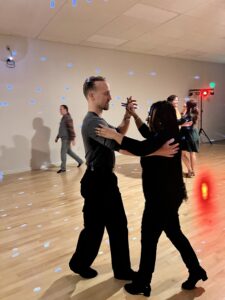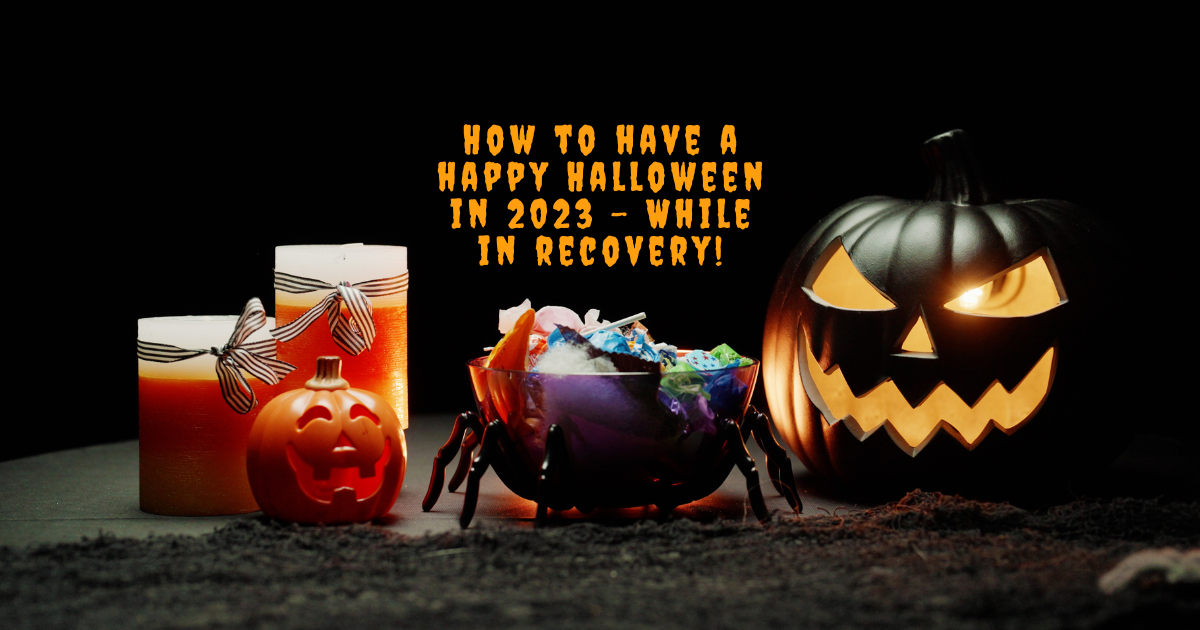Now a group therapist at Praxis of Fort Wayne by Landmark Recovery, Vixen Walker will mark her 28th year in recovery on Jan. 29, 2023. She’s become a role model, teacher, coach and friend to many others who have struggled or still are struggling with addiction. Her story serves as inspiration and proof of the possibilities that recovery can bring. Above all, her story is a message of hope.
“Stay plugged in and don’t give up no matter what,” Walker said. “There is a life after drugs. There is life after any mind-altering chemical, and life is good. It’s worth living.”
How an Addiction Began
 Walker was six years old the first time she smoked marijuana, and two years later, she was sneaking alcohol out of the bar in her house.
Walker was six years old the first time she smoked marijuana, and two years later, she was sneaking alcohol out of the bar in her house.
“By the time I got to middle school I was an expert drinker,” she said. “By the time I was in high school, I got introduced to pills and cocaine.”
Her addiction spanned from the age of 12 to 25 when she began recovery. Walker shared that even as a child, she immediately felt the drive to do more and be the last one standing while drinking around others. When she tried cocaine then progressed to crack cocaine, she felt things begin to spiral out of control. She eventually developed an addiction to multiple substances.
“By the end, I had an issue with everything,” she said. “I didn’t have a particular drug of choice. I wasn’t able to manage anything. Everything I used, I went overboard. And I liked everything.”
Addiction Impacts Newborns
Not everyone experiencing addiction will reach what many call “rock bottom.” Research shows that the earlier someone gets treatment for a substance use disorder the higher the chances are that they will sustain recovery. But after 13 years of substance use, Walker found her lowest point. It was the point where her use of drugs had a dangerous impact on her children.
Walker had three children throughout her struggle with addiction, each of them born with drugs in their system. With her first child, she was given a slap on the wrist by Child Protective Services (CPS). When her second child tested positive for cocaine at birth, CPS required Walker to enroll in outpatient treatment, but she learned how to pass drug tests and still use cocaine.
“I was able to do that somewhat successfully,” she said. “I had figured out the rhythm of using and diluting my urine and all that good stuff.”
Walker described the premature birth of her third child as the turning point for her. She was high when her water broke, and the guilt of it overwhelmed her.
“I just felt so bad like, ‘okay I do have a problem.’ I ended up going to outpatient treatment and then to a couple inpatient centers and I still couldn’t get it right. I kept using, kept relapsing, using, relapsing,” she said.
Returning to substance use is common among people who’ve used drugs for long periods of time. Addiction professionals now view relapse, not as a sign of failure, but as part of the recovery process. CPS eventually forced Walker to sign over custody of her children, aged 6, 2 and 1, to her sister until she could fully recover. This was her rock bottom.
“I was using uncontrollably, like everyday. I was gone. Just gone,” she said. “And one day I was like, ‘I don’t want to live like this. I need some help.’ I called out and prayed, ‘God, you either have to kill me or help me. Do something.’”
Walker’s stepmother, the only person she knew who had successfully recovered from a substance use disorder, had once offered to help. Now Walker was ready to take the next step toward long-term recovery. She reached out to her stepmother and cried for help on the phone, knowing at this point that she had no other choice. She needed to seek treatment and recover, for both her own sake and her children’s.
@landmarkrecovery “Be good to yourself!” 🙌🙌#youngerselfadvice #recoverytiktoks #sobertiktoks #soberlifemovement #addictionrecoverytiktok #oldselfvsnewself #recoveroutloud❤️
First Step Toward Lasting Recovery
Walker spent 10 days detoxing then relapsed that weekend. The following week, she enrolled in a 31-day inpatient treatment program.
“When I went into that treatment facility, I was just so tired. I was beaten. I was just done,” she said. “I had tried everything. My way didn’t work and I just knew I was going to die if I kept using. I went in and I just humbled myself and surrendered. I threw the towel in and was like, ‘alright, obviously I do have a problem. It is me.’”
She described the overwhelming sense of relief and safety she felt while in treatment. Surrounded by others experiencing addiction, she finally didn’t feel alone. Throughout those 31 days in treatment, she learned about addiction from a clinical aspect, and realized she wasn’t crazy or a bad person. She was suffering from a disease that had rewired her brain.
“Being in treatment gave me safety. I felt safe, you know? I felt like I could grieve, and really deal with myself and not worry about my kids, what I’m going to eat, where I’m going to get my next hit from, all that stuff. It put me in a safe space,” Walker said.
Two weeks into her treatment, Walker’s sister, who had been sober, relapsed and dropped the children off with a cousin. Walker was faced with a hard decision – stay in treatment or go to her children.
“A big part of me was like, ‘go home and get your kids,’ but I knew if I went home and didn’t stay and stick out my commitment, that I wasn’t going to stay clean. I knew it,” she said. “So I had to make the decision to leave my children and I wasn’t even sure where they were. I believed that my cousin wasn’t going to mistreat them or anything like that. I had to stay.”
Staff at the facility provided Walker with recovery resources and information on 12-step programs and other support groups. She joined Narcotics Anonymous and remains an active member today.
Growing and Giving Back
Upon completion of residential treatment, Walker immediately picked up her children and relocated the next day. She went back to school to earn a master’s degree in business administration. She got a job and bought a house. For the first time in her life, she felt a sense of order.
Due to their young ages, Walker’s children did not fully understand what their mother had gone through or why. She reflected on a memory of her then 12-year-old daughter complaining about cleaning and thinking that the halfway house they once lived in had been a mansion.
“She said, ‘I’m sick of doing this every Saturday. I wish we still lived in that mansion with the maid.’ I was like, ‘What are you talking about? When did we live in a mansion?’ She said, ‘You know, when we first moved here, we lived in a mansion with that maid,’ and I said, ‘Girl, that was a halfway house!’ She said, ‘Really?’ and I said ‘Yes.’”
Now grown, Walker’s children are understanding and sympathetic toward addiction and the hardships their mother went through. She often serves as a resource for her children’s friends who struggle with substance use.
“They’ll call me and be like, ‘I just gave your phone number to a friend’ and refer me to all of their friends. Sometimes they’ll call and be like, ‘Mom, weren’t you a crackhead? My momma was a crackhead!’ and I’ll say, ‘yeah, yeah, yeah,’ and they just can’t believe it. It’s like, they’re proud of me,” she said with a laugh. 
Walker eventually married a senior pastor, became an ordained minister and used her experience to start her own ministry for people in recovery. She began traveling to speak at events, 12-step meetings, support groups and workshops.
A friend from recovery recommended she take a job with Landmark Recovery. She began working with patients at one of Landmark’s facilities and discovered a passion for helping those who struggled the way she once did. She eventually applied to serve as the facility’s group therapist and got the job.
“It just kind of happened. I say it was a God thing,” she said. “Now that I’m in it, I just feel like I’m giving back. It doesn’t even feel like work, it just feels like service.”
Looking back at the last 28 years she’s spent in recovery Walker is proud of herself and excited for the future.
“I still remember the first month, wondering if this is the day I’m going to get high. Now, I’m just so grateful. My life is full,” she smiled.
Her children have given her four grandchildren whose lives she plays an active role in. Since finding recovery Walker has focused on her health and happiness, participating in hobbies like stand-up comedy and ballroom dancing, both of which she dreamed of doing as a child before addiction overtook her life.
Saving Yourself
In the years since beginning recovery, she has endured significant trauma, losing multiple family members to addiction and going through a painful divorce. To those in recovery experiencing similar trauma and feeling the urge to use substances again, Walker encourages you to remain steadfast and focus on your goals.
“We have these excuses and these reasons and they may be logical, but they’re not giving us the life that we so deserve,” she said.
For those still experiencing active addiction, there are resources available for you. Whether it’s a 12-step program, SMART recovery, a sober living home or residential treatment at a facility like Landmark Recovery, Walker urges you to take advantage. Therapy, recovery coaches and support groups are available to you throughout and after treatment to assist you in achieving long-term recovery.
“There is so much information out there now, so much help and so many resources that no one need ever die from the horrors of addiction,” she said. “It’s gonna take some work. I had to come to the realization that no one was really coming to save me. I had to stand up and do some work to save myself. Hang in there, that’s what I want to say.”
If you or a loved one are struggling with drug or alcohol addiction, call 888-448-0302 to learn about the resources available to you. The recovery specialists at Landmark Recovery are available 24/7 and ready to help you live the life you deserve.

Choose Recovery Over Addiction
We're here 24/7 to help you get the care you need to live life on your terms, without drugs or alcohol. Talk to our recovery specialists today and learn about our integrated treatment programs.




